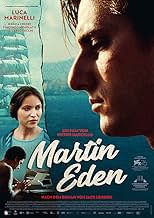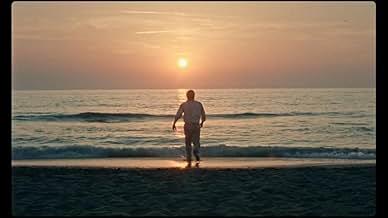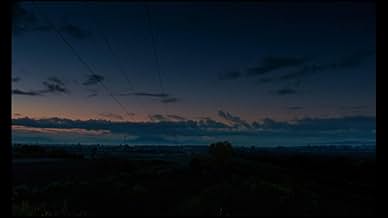Martin Eden
- 2019
- Tous publics
- 2h 9min
Martin Eden s'efforce de surmonter sa situation de misère et de prolétariat dans une quête intense et passionnée d'auto-apprentissage, dans l'espoir de se faire une place parmi l'élite litté... Tout lireMartin Eden s'efforce de surmonter sa situation de misère et de prolétariat dans une quête intense et passionnée d'auto-apprentissage, dans l'espoir de se faire une place parmi l'élite littéraire.Martin Eden s'efforce de surmonter sa situation de misère et de prolétariat dans une quête intense et passionnée d'auto-apprentissage, dans l'espoir de se faire une place parmi l'élite littéraire.
- Réalisation
- Scénario
- Casting principal
- Récompenses
- 13 victoires et 54 nominations au total
Avis à la une
Cons: Everything goes well, until halfway the film gets to the essence of things. That is when the contradiction starts, disappointing superficial (childish) arguments empty of essence, and the poor viewer who identified with the main character, feels betrayed up until the pointless unoriginal ending of the movie.
In short, it's a self-contradicting film based on the flawed approach of the original author of the novel (Jack London) who even admitted "I must have bungled it", and was made worse by the filmmaker. The writers (the director Pietro Marcello along with Maurizio Braucci ) even added a known politically misleading cliche-phrase as-a-fact, -that doesn't exist on the book, and is worth mentioning here since the movie has a pseudo-political narrative: "Philosophy was born because the Ancient Greeks were able to avoid physical labor thanks to their slaves who allowed them to devote themselves exclusively to thought."
-Why then philosophy wasn't born somewhere else, where slavery was flourishing in the whole known world for centuries? -Why philosophy that set man on its center for the first time in history, was born after democracy was invented and established for the first (and only) time and shifted all power to the people? -Why philosophy was born on a state that gave the slaves more privileges than the privileges of the citizens of the rest of the world, and conversion of a citizen to slave was prohibited by law (and all slaves were foreigners brought from abroad and had equal rights with every citizen except voting)? So, was philosophy born due to the slaves in Ancient Athens, or due to the fact that democracy freed thought for the first time, logic and rhetoric was born, schools of thought, that attracted all wise men from around the world to see, learn and contribute to the "miracle"?
So, please try not to parrot false, misleading cliche, especially the ones about history, it's neither good for you, or your viewers.
JIM'S REVIEW: (MILDLY RECOMMENDED) Martin Eden is an artistic muddle of style over substance. Loosely based on Jack London's semi-autobiographical novel, Martin Eden told the story of working class struggles and oppression set in the early 1900's. Director Pietro Marcello has taken that novel and transported that story in place and time: The title character now lives in Italy, although the time frame is purposely confusing. It seems to take place somewhere in the mid-20th century, although the anachronistic fashions and technological devices collide frequently to raise some doubt.
Plot details remain the same as Mr. Marcello follows the same basis premise of the book. A working class man searches for a better life. Doing menial jobs, he yearns for a better education and wants to become a published writer. Martin's ultimate goal is important to him, as he has fallen in love with a rich and pampered upper-class girl from a strictly bourgeois family. Martin meets other figures that spur him into action during his class struggle for success, with tirades against socio-economical injustice and protests about socialism, democracy, unions, and the rights of individuals being freely bantered about throughout the film.
We follow Martin's journey with high interest and remain captivated by the film despite constant cross-cutting of archival footage that adds atmosphere and further confusion. The handling of these jarring images is innovative yet infuriating as it addles the moviegoing audience. Mr. Marcello's vision upends the essential storytelling and overcomplicates his movie with these flourishes. (At one point, I wondered if these cinematic intrusions were a political statement of society's ills, Martin's actual written stories brought to life, or just heavy-handled historical documentations from that century...I still don't know. What I do know is that the overall effect remains jarring and undercuts the narrative.)
Through 2/3 of the film, this reviewer was intrigued with Mr. Marcello's bold approach to the material despite the aforementioned major flaws in his execution. But the last third of the film makes absolutely no sense. Leaps of logic are everywhere. Once the ship literally sinks (and it does), the story bounces ahead to an entirely different Martin, one with dyed blonde shoulder-length hair and rotting front teeth who is cynical about life but still rants against the inequities of wealth and power. The final shot negates everything before it. (Again I wondered if I skipped a reel or two due to the lack of continuity.)
The cast is uniformly strong, especially Luca Marinelli in the title role. His 50's matinee idol good looks create a likable hero and the actor is excellent in his well-defined role. Jessica Cressey makes an attractive love interest, although their relationship is predictable in its conclusion. Adding fine support in their supporting roles are Carmen Pommella and Carlo Cecchi.
All in all, Martin Eden is too artsy for its own good. It forgets its own working class roots. Less artistic license would have delivered a stronger film. Ostentatiousness reigns. When style overrides the story, one questions its real purpose. The film puts on airs that only the bourgeois could love. Martin would have railed against it. (GRADE: C+)
"Martin Eden" doesn't take place in any specific time period, or rather it takes place across all time periods, a nod I suppose to the fact that the conflict between those who are wealthy and those who are not has been and will be with us forever. It also examines the role art and artists play in shaping cultural and political thought. It's an artful movie, but it overstays its welcome. Martin Eden is an intense character and not an especially pleasant one to spend time with, and good as Marinelli is, he can't save the last third or so of the movie from being a bit of a slog.
Grade: B
Le saviez-vous
- AnecdotesShot on Super 16mm.
- Citations
Martin Eden: So the world is stronger than me. Against its power I have nothing but myself, which, in any case, is quite something. For as long as I don't let myself get overwhelmed, I am also a force. And my force is fearsome as long as I have the power of my words to counter that of the world. Those who build prisons don't express themselves as well as those who build freedom.
- ConnexionsEdited from Il passaggio della linea (2007)
Meilleurs choix
- How long is Martin Eden?Alimenté par Alexa
Détails
- Date de sortie
- Pays d’origine
- Sites officiels
- Langues
- Aussi connu sous le nom de
- Martín Eden
- Lieux de tournage
- La Balzana, Santa Maria La Fossa, Campania, Italie(Martin living in countryside)
- Sociétés de production
- Voir plus de crédits d'entreprise sur IMDbPro
Box-office
- Budget
- 4 400 000 € (estimé)
- Montant brut mondial
- 3 132 976 $US
- Durée2 heures 9 minutes
- Couleur
- Rapport de forme
- 1.66 : 1
Contribuer à cette page


![Regarder Trailer [OV]](https://m.media-amazon.com/images/M/MV5BNDBhMzE5MWItYTQyYy00YTAyLWFkYWQtNTE2N2YxYmE5ZTcyXkEyXkFqcGdeQXRyYW5zY29kZS13b3JrZmxvdw@@._V1_QL75_UX500_CR0)



























